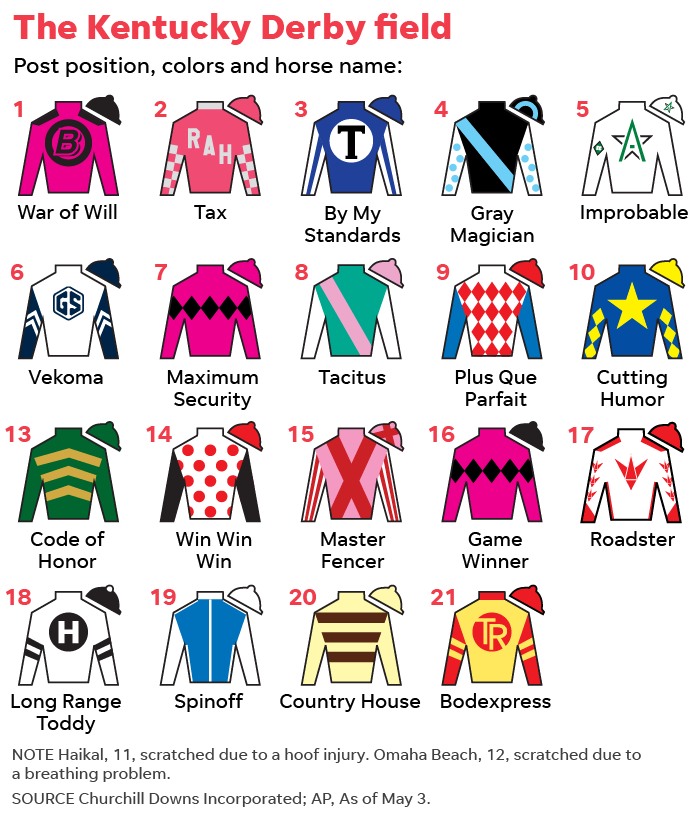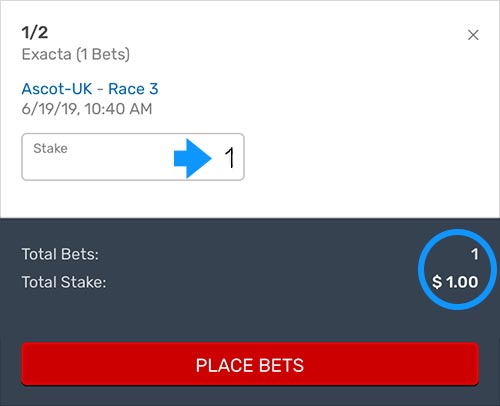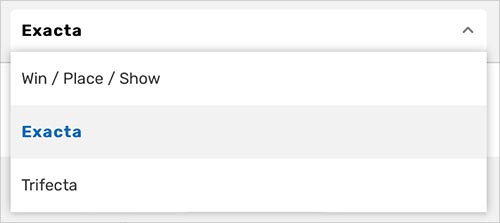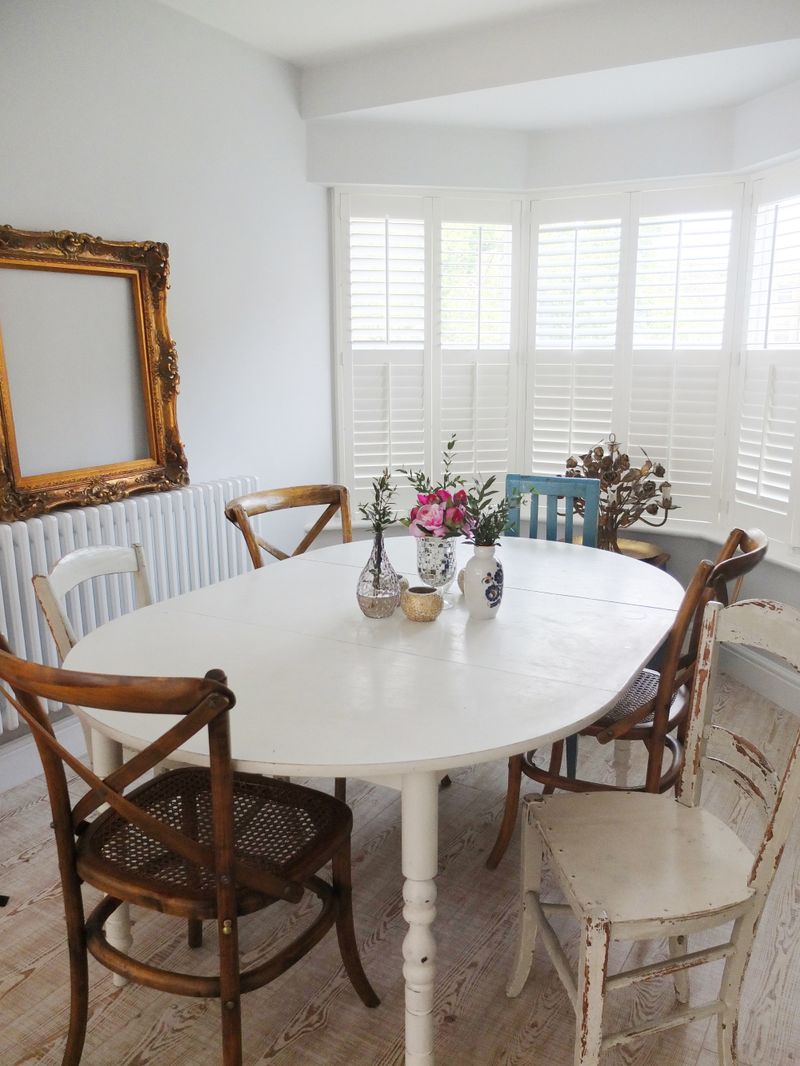What Is An Exacta Bet
There is simply no sport in the world quite like horse racing. Showcasing pure power on the track, it’s no wonder why these horse and jockey combinations command the attention of millions of punters around the world every single week. But what happens on the track is only part of what makes this sport so fun, as the betting markets in the world of horse racing never fail to bring the action.
What exactly is an exacta bet in horse racing? Exacta bets are when punters select two horses that they think will win and place, as well as the order in which they do so. What is the minimum stake on an exacta bet? Stakes start at $1 in some places, and $2 in others. Exacta Horse Betting Exacta betting gives bettors a different way to approach a horse race rather than just betting on a single horse to win, place or show. In an exacta bet, you’ll win if you can predict the first two horses in the official order of finish.
From a basic flutter and beyond, there are countless ways for you to bet on the big (and not so big) races out there. If you’ve moved beyond the win, place and show side of betting — and we’re sure that if you are reading this article you likely have — it’s time to increase the potential returns with something more exotic or “exact.”
Odds are an exacta bet is exactly what you’re looking for. The following looks at the ins and outs of exacta betting, so you know exactly what you’re getting yourself into before you put down any cash.
What is an exacta bet?
Exacta bets, also referred to as perfecta or exactor bets, involve a bettor choosing two horses he thinks will place in the top two positions. Unlike the popular quinella bets, exacta bets require you to select the correct finishing order of the top two horses.
If your choices win and place, but in the order other than what you specified, you win absolutely nothing at all. To guard against this possibility, exacta bets allow you to box your horses, so that all possible combinations are covered. This increases your odds of success, but it also increases the cost of placing a bet.
Types of exacta bets
Like the quinella bet, an exacta bet is anything but one-dimensional — don’t worry, we’ll be comparing those two types of bets and clearing up a few misconceptions later on. Looking strictly at exacta bets, depending on how much risk you want to face, there are various ways for you to place such a wager.
While you might have to crunch the numbers, there is nothing to fear with exacta bets; it just takes a little knowledge to get the best out of them. The following are the three main types of exacta bet, with the requirements for each explained in detail.
Straight exacta
A straight exacta is exactly what the description above says. You pick two horses and the order in which you believe they’ll win and place. If you’re right, you win. If you get the order wrong, you lose, even if they both win and place.
The format is as follows: You place a 3-6 exacta bet for $2. This means that you expect horse No. 3 to win, and horse No. 6 to place. If the reverse happens, you win nothing. If it sounds simple, that’s because placing a straight Exacta bet pretty much is.

Exacta box
Exacta boxes are more flexible than straight exacta bets, which carry a higher amount of risk. These bets allow you to select more horses that you think will finish first or second. Each combination counts as a $2 bet. So, say you think horses 5 and 8 will win and place. You’d place 5-8 and 8-5 bets for $2 apiece, for a total of $4.
Fortunately, you aren’t limited to just two horses — you can select as many horses as you want to. This will substantially increase the odds of getting a payout, with the downside of exponentially increasing your bet size.
This type of exacta bet won’t limit you to the number of horses, but the significantly increasing odds of success are reflected in the price scheme for placing such bets. A bet with three horses would cost you just $12, but the cost of four or more horses is significantly higher.
Here is a quick example of how the pricing scheme would work, as the cost scales exponentially with each horse you add to your betting pool:
- 4 horses = $42 total bet
- 5 horses = $120 total bet
- 6 horses = $240 total bet
Since the cost does not scale linearly, it rapidly reaches the point where the cost of adding more horses onto your bet does not overcome the increased odds of winning.
In the most extreme case, betting on eight horses will net you about $30 in winnings against a cost of nearly $680. While victory is virtually guaranteed with such odds, you’ll actually lose a lot of money making such a bet. Figuring out the most effective cost-to-bet ratio is an exercise best left to veteran players who understand the math of probability and statistics inside and out.
Exacta wheel
An exacta wheel bet involves bettors picking at least one horse that they think has what it takes to win reliably. This horse will serve as a common thread in a number of bets with different combinations of horses that you think will win. As an example, say you think horse 3 is the prime choice.
You want to select horses 1, 2, 5 and 6 as well. If you were only confident in horse 3’s ability to win or place consistently, you could place your bet like this: bet a wheel with horse 3 over 1, 2, 5 and 6. These five horses would yield a total bet size of $8 rather than $40, and would contain a much wider range of winning combinations.
The lower bet size coupled with greater odds for success make this a prime option for bettors looking to maximize their odds of getting a payout.

How to play the exacta key
Exacta keys are a popular way to maximize your chances of winning. The name comes from the fact that you think one horse is “key” to winning all your races, but you aren’t so sure that the other horses are up to finishing where you would like. You might think that horse 5 is the best, but horses 2, 6 and 8 might also be good choices to place. You select horse 5 as your key, and add the other three horses to your tickets. Horse 5 is selected to win, while all the other horses can place.
As you have probably guessed already, there are some similarities between an exacta box wager and playing the exacta key.
What is the difference between an exacta and exactor Bet?
Exacta and exactor bets are two names for the same type of bet. These are bets in which you select two horses that you think will finish in the top two slots. You must select the horses in the correct order, or you’ll win nothing even if they still win and place. Some people seem to feel that an exactor bet is something different entirely. Not being one to burst anybody’s bubble, but it isn’t.
How to calculate an exacta payout
There’s no “average” payout for an exacta bet — it varies significantly depending on the race, horses, track and even the weather. If two horses who are heavily favored to compete, you’ll likely win less than $12 on a winning ticket. Larger fields will boost this to around $35. If you’re feeling lucky, you can bet on a “dark horse,” which can yield returns in excess of $1,000. We know, this is simple horse race betting 101 for the most part, but there is a little more to it than that.
Because exacta bets vary so much even between races, scoreboards will commonly display the expected payouts for different kinds of exacta wagers. This gives you a prime opportunity to inspect for possible overlaps or advantageous combinations of horses. Alternatively, you can skip combinations that are less likely to pay out, and adjust your betting strategy accordingly. Most race tracks pay out exacta bets in $2 increments, starting at the minimum of a $2 payout.
Here are the calculations you’ll be looking at should you be looking at making an exacta bet:
- If you place a $2 exacta box with both combinations, that will cost you a total of $4, because it means that both combinations of showings can net you a payout rather than just one.
- If you place a $2 bet on a combination of three horses, this will now set you back $12 instead of $4. In this scenario, any two of the three horses you bet on can win and place, and you’ll still get a payout.
- If you place a $2 exacta key bet, then you will pick one horse to win in each race, and all the others must place. This will cost you $12. If you decide to go with two horses over four horses in an exacta key bet, then you’ll still have to pay $12, with an increment of $2 thereafter.
Quinella vs. exacta box
Due to the superficial similarities between the two bets, a lot of gamblers find themselves confused as to the difference between exacta and quinella bets. On the surface, they appear to be the same — so why would a bettor choose one format over the other? One key reason is because the lowest bet you can make is fixed at different amounts. Exacta bets used to require a $5 minimum versus just $2 for quinella, but this rule has been relaxed in some places. In some places, the cost of the two has been equalized to account for the extra tickets exacta bets need to achieve the same odds of payouts as quinella bets.
Quinella bets are often appealing to punters who are new to exotic bets, because the order in which their chosen horses finish does not matter at all. If you choose horse 3 and horse 5, they can finish in either order and give you a payout, so long as they both take the top two spots. Exacta bets are less flexible and require you to specify the correct finishing order of the horses. You can box your exacta bets to neutralize the odds, but this will cost you additional money for each bet you place. After considering the differing odds between the two, the payouts typically don’t vary too much. Which one you choose often comes down to preference.
That being said, a key distinction between the two is that the quinella bet counts as a single bet, whereas the exacta bet is considered to be two bets for the same odds. Quinella and exacta tickets both cost $2, but getting the same “coverage” with exacta bets requires you to buy two tickets rather than one, effectively doubling the cost to play with the same odds. And, because the track takes part of the winnings for itself, going the exacta route means that you’ll have to pay this fee twice. While the house might vary the percentage take between the two formats, in most cases exacta winds up costing you more.
FAQ
What exactly is an exacta bet in horse racing?
Exacta bets are when punters select two horses that they think will win and place, as well as the order in which they do so.
What is the minimum stake on an exacta bet?
Stakes start at $1 in some places, and $2 in others. If you’re gambling online, the minimum amounts are the same as if you were betting in-person.
How do I make an exacta bet?
Good news — you don’t need to be at a major horse racing track to make exacta bets. As a matter of fact, you don’t even need to be there at all. Nowadays, exacta bets can be placed online in most jurisdictions. Keep in mind, though — this isn’t true everywhere. We highly encourage you to check your state’s laws on online gambling before you go placing bets.
How much can I win with exacta bets?
The sky’s the limit when it comes to exacta bets, and if you have a “go big or go home” attitude, you can make an exacta wager to rake in the cash. Just remember that winnings are handled by the pari-mutuel system, which governs how prize money is distributed.
Which pays more, exacta or trifecta?
The trifecta always pays much more than exacta, because the odds of victory are significantly lower. In addition, the payouts are also determined by how much money was paid into them by all the combined bettors. Because trifecta bets have such long odds, not as many people buy tickets for these kinds of bets. Exacta bets usually attract more bettors, but the risk/reward ratio of trifecta bets attracts some people who might have otherwise bet exacta on a race.
Bet on HorsesGet up to a $500 New Member Bonus
BUSR is the best site to bet on horses. Why? Because, all new members will get up to a $500 bonus for joining and you can also qualify for an extra $150 bonus!
Start your horse betting with BUSR today!
'Give me a $20 exacta, 3-7. I have have this in the bag.'

What is an Exacta, Exactor or Perfecta?
They are all one in the same.
At the ticket window, pick the two horses that will finish in first and second place in the EXACT order. You win your bet if the horses you pick finish in first and second place in the EXACT order.The minimum amount that can be wagered is $1 but keep in mind that payouts would be paid out at half as the odds are calculated at a $2 bet value.
Exacta Box
With an Exacta Box you will win your bet if the horses you pick finish in first and second place in either order with as many horses as you wish.
The minimum amount that can be wagered is $1 per combination. So a 2 horse exacta box at $1 will cost a minimum of $2. A further breakdown:
| $1 exacta box of 3 horses = 6 combinations = $6 |
| $1 exacta box of 4 horses = 12 combinations = $12 |
| $1 exacta box of 5 horses = 20 combinations = $20 |
| $1 exacta box of 6 horses = 30 combinations = $30 |
| $1 exacta box of 7 horses = 42 combinations = $42 |
| $1 exacta box of 8 horses = 56 combinations = $56 |
Exacta boxes they are the most popular method of playing exactas because they are easier to understand and offer the greatest chance of cashing a ticket.
It is important to note that this is not a wise betting strategy simply because all of the horses in the box do not have the same chance of finishing first or second. Your ticket may pay out at a loss.
Because exacta boxes rate each combination in the box as having the exact same probability of winning (which is never the case) they produce a bias in the exacta betting pools. It is this bias that smart bettors look for and try to take advantage of.
Exacta Wheels
Pick a horse to finish either first or second and wheel it in the exacta, you cover every combination so that if your horse finishes in the first or second position, you will have the winning combination.
For example, if you were to play a $1 exacta wheel with a 'key' horse of #3 to come first, the #3 horse would have to win and any of 1,2,4,5,6,7,8 would have to finish second in order for you to cash your ticket.
Or, if you think the 'key' horse #3 has a better chance of finishing second, you might play a $1 exacta wheel. In this case any horse in the race could win and the 3 horse would have to finish second in order for you to cash your ticket.
Either way, in an eight-horse field it would cost you $7 as you are wagering 7 separate $1 exactas betting horses 3-1, 3-2, 3-4, 3-5, 3-6, 3-7, 3-8 or horses 1-3, 2-3, 4-3, 5-3, 6-3, 7-3, 8-3.
Exactas can also be played as part-wheels where you might play a $1 exacta part-wheel horse #3 with 2, 4, 5 (three possible winning combinations of 3-2, 3-4, 3-5) at a cost of $3. Or you might play the part-wheel the other way, 2, 4, 5 with 3 (also three possible winning combinations of 2-3, 4-3, 5-3) at a cost of $3. Part exacta wheels reduce some of the bias of betting exacta boxes.
Exacta Betting Strategies
Through handicapping you determine horse #5 has a 50% chance of winning the race, horse #6 has a 20% chance of winning and horse #7 has a 10% chance of winning. You will be spending $60 on this race.
Option 1.
You play an exacta box of 5-6-7 which is 6 exactas at $10 each.
Exacta Key Bet
| $10 exacta 5-6 = $10 |
| $10 exacta 5-7 = $10 |
| $10 exacta 6-5 = $10 |
| $10 exacta 6-7 = $10 |
| $10 exacta 7-5 = $10 |
| $10 exacta 7-6 = $10 |
Option 2.
You play an exacta part-wheel keying #5 to win with 6, 7 and a second part-wheel with 6, 7 with keying #5 to place which is 4 exactas at $15 each.
| $15 exacta 5-6 = $15 |
| $15 exacta 5-7 = $15 |
| $15 exacta 6-5 = $15 |
| $15 exacta 7-5 = $15 |
Option 3.
You play an exacta part-wheel keying #5 to win with 6, 7 and a second part-wheel with 6, 7 with keying #5 to place based on the winning percentages you determined through handicapping: #5 at 50%, #6 at20%, and #7 at 10%.
| $30 exacta 5-6 |
| $20 exacta 5-7 |
| $6 exacta 6-5 |
| $4 exacta 7-5 |
Lets break it down by risk vs reward.
Option 1
The exacta box rates each possible combination as having the same probability of winning, which according to your handicapping is not correct.
Option 2.
The part-wheel in this case is more efficient, leaving out the less probable combinations of 6-7 and 7-6, but still rating both the 6 and 7 horses as having the same probability of winning or finishing second.
Option 3.
Offers the highest risk/reward ratio as determined #5 at 50%, #6 at20%, and #7 at 10%.
The results:
You killed it! The race ran exactly as your handicapping said it would – the 5 horse won and the 6 horse ran second. The $2 exacta 5-6 paid $20 so your returns are $10 per dollar wagered. Let's see your possible payouts:
Option 1. Exactor Box
$10 exacta 5-6 pays $100. $100 - $60 ticket cost = $40 Profit
What Is An Exacta Key Bet
Option 2. Part Wheel
$15 exacta 5-6 pays $150. $150 - $60 ticket cost = $90 Profit


Option 3. Part Wheel correlated to probabilities.
$30 exacta 5-6 pays $300. $300 - $60 ticket cost = $240 Profit
The final exacta wagering strategy, which places more money on the higher probability combinations as identified by your handicapping.
What Is A Tote Exacta Bet
Due to bias in the exacta pools, it is best to avoid combining favorites or long shots in your exactas. The best payouts are for two medium-priced horses.